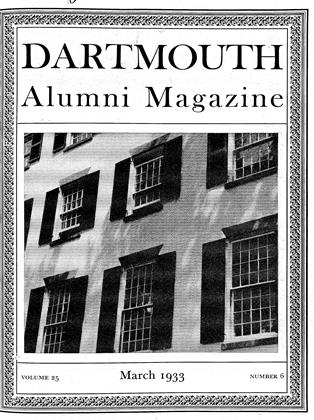WITH THE usual date for opening the Alumni Fund campaign approaching, more than ordinary interest attaches to the basis upon which the Alumni Fund Committee of the Alumni Council will present the Fund proposals to the alumni this year. After successively greater decreases in the totals received since the 1929 high-water mark, there would be a natural expectation of a further decrease, and perhaps a sharp one, amid severer general conditions than those of last year. At the same time, the College faces perhaps the largest deficit in its history. Will the alumni wish to be relieved of the pressure of the responsibility which they have undertaken for the past decade and more, to "keep the College out of debt?" Or will they take the probable deficit as a goal—though almost hope- less of attainment—and make a straining effort to reach it.
A decrease o£ $40,000 is seen in last year's total o£ not quite $90,000 from the 1929 total of almost $130,000. The falling off has come in growing amounts in the three years—eight and twelve and twenty thousand. This year's conditions are worse than last. The number of alumni who have lost their incomes, their jobs, and even their homes is greater than before. And everywhere there has been increased appeal for relief of suffering in the local communities, movingly immediate in nature.
Meanwhile those most intimate with Dartmouth affairs can't speak with any assurance about what the next few years will bring. The income from the invested endowment is greatly reduced. The stream of large gifts from friends of the College has dried up almost completely. The margin between income and the expenses of carrying on the College's educational program, for which the Alumni Fund has accepted the responsibility in recent years, will reach proportions this year perhaps unattainable by the alumni no matter how great their efforts might be under pressure of emergency needs.
It therefore appears, all things considered, that the unavoidable deficit for the year might be quixotic as a goal for the Alumni Fund. Would the alumni, under the stress of present conditions, prefer fer to be relieved this year from the urgency of striving to forestall a deficit? Such a policy—and the Alumni Fund Committee is wisely considering it- would doubtless be welcomed as an understanding one by Dartmouth men, who would then give what circumstances permit with a good heart and with- out regard to quotas.
 View Full Issue
View Full Issue
More From This Issue
-
 Article
ArticleEconomic Aspects of Mechanical Progress
March 1933 By C. E. Dankert -
 Class Notes
Class NotesClass of 1930
March 1933 By Albert I. Dickerson -
 Article
ArticleHANOVER BROWSING
March 1933 By Rees Higgs Bowen -
 Article
ArticleTHE YOUNG MAN IN POLITICS
March 1933 By George H. Moses '90 -
 Class Notes
Class NotesClass of 1910
March 1933 By Harold P. Hinman -
 Class Notes
Class NotesClass of 1911
March 1933 By Prof. Nathaniel G. Burleigh







